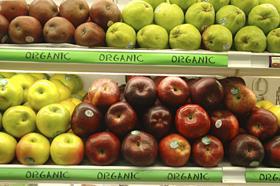
The UK organic market has hit an all-time high of £2.2 billion in value, putting the category ahead of the post-recession sales slump that began in 2009.
In its 2018 Organic Market Report, the Soil Association detailed a sixth straight year of growth, with a six per cent sales increase and organics now accounting for 1.5 per cent of the total UK food and drink market.
Fresh produce had the highest value growth of any organic sector, with the rise equating to an extra £20 million in sales. Fruit and vegetables have a 24 per cent share of organic food and drink, just behind dairy on 28.7 per cent.
Last year saw organic sales in independent retail rise by 9.7 per cent and home delivery by 9.5 per cent. Almost 30 per cent of organic sales now take place online or on the high street, with supermarket sales increasing 4.2 per cent, outstripping the two per cent increase in non-organic sales.
Clare McDermott, business development director at Soil Association Certification, said: “One of the biggest stories for organic over the past couple of years has been the rise of online shopping, and it’s a trend that shows no sign of slowing down. Driven by convenience, an ever broader range of choice, and by younger generations entering the market, it’s no surprise online sales are outperforming the traditional supermarkets on organic. Online retail is also able to adapt and innovate at a faster pace than in-store, bringing new and trend-led products to market, and people are recognising that they can often find a better range online.'
Among the retailers, Ocado has committed to stepping up its organic offer even further. Its head buyer Rose Price said: “We know how important organic is to our customers, and that’s why we’ve spent the last year expanding our ranges of organic to meet rising demand. As a result of a recent Meet the Buyer event, we are hoping to launch over 100 new products during 2018.
'We see no end to the strong growth in organic, as the market has been buoyed by a new generation of shoppers looking to spend their earnings on food and drink that is not only better for them, but also for animal welfare and the environment.”
There was also a positive picture in the eating-out sector, with spend on organic food and drink in foodservice rising 10.2 per cent to £84.4m.



